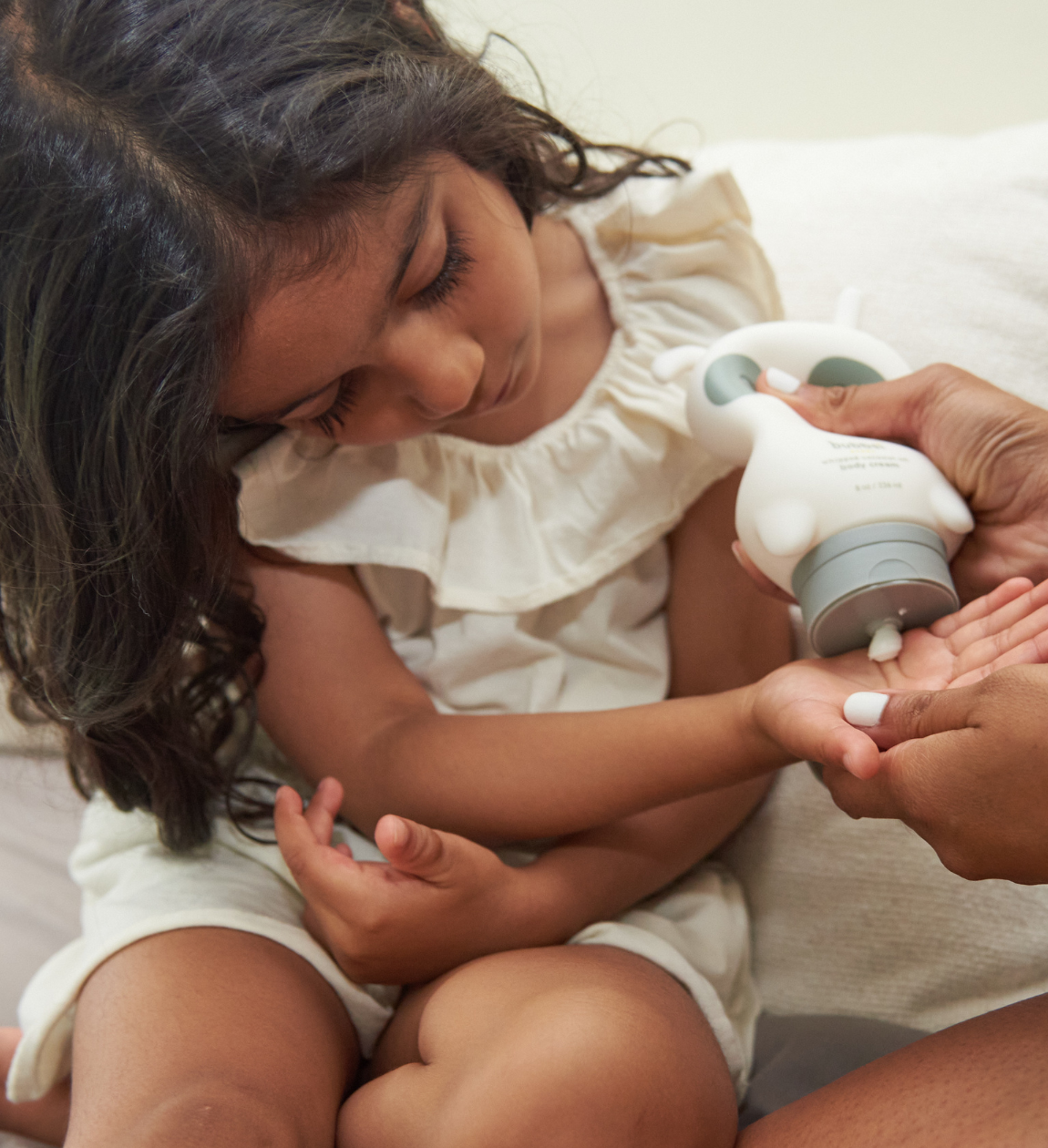Like any mom of a child with eczema (or “ecze-mamas,” as I like to call us!), I’ve read my fair share about this seemingly widespread skin issue. I’ve recently been fascinated with the link between eczema and food allergies and learned a lot from this episode of the After On podcast with Dr. Kari Nadeau, one of the nation’s leading experts in adult and pediatric allergies (who is also a mother of five! #momboss). Dr. Nadeau spoke about the fundamentals of food allergies, and the new reasoning behind how they can be associated with eczema. Among many other important findings, her research suggests that preventing and/or treating eczema early in life could be one way to reduce a child’s chances of developing food allergies. In addition to the podcast, I’ve learned a lot from the blog posts from our friends at Lil Mixins, a company that makes products for early allergy introduction.
—Sweta Doshi, Bubbsi founder
Here are 7 things we have learned about eczema and allergies.
1) Food allergies have grown at an exponential rate in both adults and infants.
This probably comes as no surprise to a parent, but since the 1940s, the amount of people with food allergies has been steadily increasing. Just 0.1% of the population under the age of 21 had a food allergy in the 1940s. In the 1970s this increased to 0.4%, and in the 1990s this became 0.8%. As of the 2000s, 8% of the population has some kind of food allergy.
2) People with eczema are more prone to food allergies.
Normal skin provides a barrier between us and the outside world, keeping moisture in, and preventing irritants and allergens from getting through to stimulate the immune system. In dry, cracked, or eczematous skin, the opposite occurs. Water is lost, and irritants are able to penetrate the skin to cause allergic inflammation and itching. So, it makes sense that children with eczema are more susceptible to allergies when their skin simply can’t keep out allergens.
Another way to think about it: Eczema is a sign that your baby’s immune system is overactive. The more severe the eczema is, and the earlier it starts, the more the immune system is going crazy, and the more likely a baby is to develop food allergies. An immune system that is overactive is more likely to mistake harmless food as a danger.

3) Many food allergies can stem from the skin’s exposure to an allergen.
Many doctors are convinced cracks in eczema skin are the number one way that eczema causes food allergies, and they have called it the Dual Exposure Hypothesis. Think about it this way: Eczema causes itching and dry skin. Very dry skin, or skin that has been scratched enough, will develop cracks. Some of these cracks are too small to see; others bleed or have scabs. When babies get food all over themselves, or even just crawl around, bits of food or dust get into those cracks.
A baby’s immune system will get scared by protein that it thinks broke through the skin. Once the immune system learns to be scared, it thinks harmless food is dangerous. This is what a food allergy is. The body’s immune system activates and begins to produce antibodies that protect against the perceived allergen. Eczema skin also gets infected easily, and infected eczema skin makes the immune system rev-up even more.
4) Scratching causes food allergies.
New research, so far only done in mice, at Boston Children’s Hospital showed that the simple act of scratching the skin increases the chance of allergic reactions to foods, including anaphylaxis. The study showed that when you injure your skin by scratching, the immune system releases certain immune cells in the small intestine. Putting so many unnecessary immune cells in the small intestine can cause them to overreact to any food proteins that are undigested, leading to a food allergy.
5) Food allergies are distinct to their environment.
Allergens that are specific to your environment play a key role in the food allergies you could potentially develop. For example, in Arizona, kids with environmental allergies to pollen often test positive for food allergies related to corn, carrots, tomatoes, potatoes and rice. In Arizona there’s a lot of pollen in the air, and because the foods listed above have proteins similar to that pollen, the immune system often cannot distinguish between the two proteins (non-dangerous food vs. pollen). And this is how most food allergies work—your immune system attacks the proteins in good food, thinking they are bad protein particles.
6) Past U.S. guidelines misunderstood aspects of food allergies.
The U.S. guidelines in the 2000s informed parents to delay exposure of foods like peanuts, shrimp and soy to their children. It wasn’t until 2009 that researchers started learning that other countries had exposed kids to the same foods, and those children mostly avoided the associated allergies. New national guidelines were released in 2011, letting parents know that exposure to some of these foods was, in fact, a good thing. Doctors now recommend introducing allergens like peanuts as early as 4 months so that the gut can learn to recognize it.
*One more plug for our friends at Lil Mixins, which makes early introduction of peanut & egg super easy with their powders, that you can add into breast milk or food. (This is #notanad! We are just fans!)
7) The Five D’s of Food Allergy Prevention:
In addition to diet, there are other factors that researchers believe could prevent food allergy incidence, two of which have to do with skincare!
- Dirt: We’ve become so clean that our immune system forgot about good bacteria, so exposure to dirt can be beneficial, helping the immune system distinguish good and bad.
- Dogs: Dogs do the same thing as dirt. Getting exposed to dogs early in life can also help train the immune system.
- Dry skin: Cracks in babies’ skin can allow exposure to allergens, leading the immune system to become maladaptive. Moisturizing and treating dry, cracked skin during early childhood can repair the skin barrier and prevent potential allergens from entering through the skin.
- Vitamin D: Exposure to sunshine causes the production of vitamin D in the body, and a low intake of vitamin D showed an increase for allergy risk, according to Dr. Nadeau. So days spent in the sun, with proper sunscreen, are not only fun, but they’re preventative measures for food allergies!
- Diet: We should diversify diet early on to aid in gut exposure. In fact, Dr. Nadeau’s studies have found that when a pregnant mother eats common foods associated with allergies, she is exposing herself and her baby to these particles for the better. This gut exposure helps antibodies learn early on how to differentiate good food from bad allergens.

As we’ve discussed in a previous blog post, separate research suggests that early moisturization can help prevent eczema. The above research suggests that it could even help prevent food allergies down the road. That means that childhood skincare can impact health even later in life. Bubbsi’s naturally-derived products are formulated to moisturize your kiddo’s delicate skin.
While everyone’s skin is different, many Bubbsi customers have seen success with our products on dry, sensitive, and eczema skin. Here are some testimonials:
“I bought this as a last, very desperate attempt to help with my daughters out-of-control eczema. After trying pretty much EVERY lotion, soap and topical prescription medication, nothing was helping my 5-year-old’s skin. Her dermatologist wanted her on steroids, and I REALLY did not want that. After just 3 short days her redness was gone, and the dry patches are shrinking. I could not be happier. I 100% recommend this to any other parents who have kiddos with sensitive or troubled skin. Thank you, Bubbsi, for helping my daughter, and making such an amazing product!” —Francesca
“Our 6-month-old developed eczema, as many babies do. Bubbsi cream and balm have been far more effective than anything else we have tried. The benefits of coconut oil, without all of the greasiness and stains on clothing. Regular application of the cream followed by the balm keeps his skin from drying out, and relieves itching. He also loves to play with the bottles. Fantastic products, a must-use for children with eczema!” —Amar
Read more testimonials and shop Bubbsi’s moisturizing skincare products here.
Shop the Post









